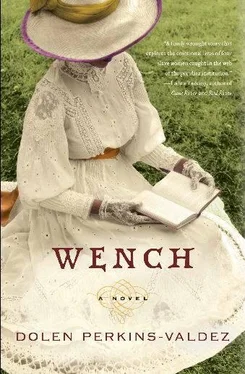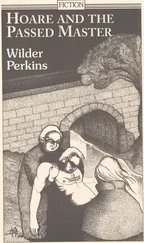For now, she just kept in step with the chorus of chores.
The next morning, while Sweet was still asleep and her master had not yet returned to the cottage as he waited for the “air to clear,” the women discovered the baby dead in her arms. They wrapped it in layers of cloth and took it to Philip who summoned the other men to help him prepare a small grave. Then they returned to Sweet’s doorstep and lingered outside as they searched for the plainest words of compassion. The sound of her voice from inside broke their trance and quickened them into action.
“The baby? Where my baby? Where my girl?”
Reenie, in her usual manner, delivered the news. “Her Father took her.”
“Her father?” Sweet’s voice was hopeful, but in less time than it took to blink twice she understood, knew in her heart that Reenie meant Father and not father. And her face did not crack. She lay back, silent, as if all the wailing of childbirth had sucked her clean of any more sounds. And the trio of women who had known their own share of this kind of grief left her there, not coldly or callously, but with the understanding that she needed to be alone. Later, they would return to clean and dress her labor wound. But for now, they filed out, heads up, eyes as dry as they could muster.
Lizzie returned to her cottage to find Drayle just rousing from his sleep. He took the news quietly and asked if she wanted to kneel in prayer and she said yes. She whispered a fierce prayer, a tangled mess of biblical verses and cries of “have mercy, have mercy.”
When she was finished, he placed his hand on her head reverently, devoutly, as if he were a preacher anointing her. Something in his touch flowed through her and helped her to make peace with the loss, which for some reason felt like her own. Then he left her kneeling there in her own thoughts, just as they had left Sweet. And she stayed there for a moment, disoriented, alone.

Then she walked out of the cottage, down the worn path that led between the houses toward the woods. There was a post where Glory delivered eggs and freshly slaughtered chickens or hogs to the hotel each morning. It was a white post and on it was painted: TAWAWA HOUSE each morning, two servants, colored women from the hotel, met Glory there and took her bundle. Sometimes they were late, and often Lizzie had walked by and seen Glory standing there, waiting patiently with her bundle on the ground beside her.
It was early, and Lizzie was almost certain that Glory had not yet arrived for her daily delivery. She spied the white post in the blue light of the morning, its natural wood already beginning to etch through the paint.
She sat on the ground and waited for Glory, her legs tucked beneath her. She wondered if Glory knew the pain of a dead child. The woman did not have children even though she had long been of childbearing age. Surely she did, Lizzie thought. Surely she had her own heft of memories.
Lizzie watched the sun break over the tops of the trees and listened to the gurgle of a nearby creek. She witnessed two sparrows play catch-and-kiss. She waited patiently for the white woman.
The first night he went to Lizzie, she was soaked with a sticky wetness that clung to her. The door was more than cracked, but it hadn’t done much to relieve her in the small storeroom. She had extinguished her candle because even its flame sent off more heat than she could bear. One arm rested above her head on the moss-filled pallet and a foot was planted against the shelf, her legs propped wide. Looking back, she reckoned she must have looked as if she were waiting for him.
She had been owned by the Drayles for six full crop cycles before her master finally followed up on his incessant staring and came to her. Before she moved into the big house, she lived in a cabin with the blind woman they called Big Mama. Big Mama was known for her soap made from lye and crackling. It was good enough to sell to nearby plantations, and had turned a pretty good profit over the years. But the woman had been blinded when a vat of lye sputtered into both eyes. Lizzie spent the early years in the workyard with her. An area of the quarters sectioned off by chicken wire, the workyard was where clothes were sewn, mended, and boiled, slave food prepared, candles made, sausage ground, and butter churned. It also contained a small vegetable patch. At one end of the yard sat a long trough where the children ate their midday meal, sometimes scooping up the mush with long-handled wooden spoons but mostly using their fingers since there weren’t enough spoons to go around. Those who didn’t work in the fields stayed in the workyard most of the day. Lizzie had never been ordered to the fields. She stayed close by Big Mama’s side, filling in for the old woman’s eyes.
According to Big Mama, the Drayle plantation had originally belonged to Miss Fran’s family. Big Mama had nursed Fran as a baby. That’s how long she had lived there. Although the slave cabins remained the same, Drayle had added a kitchen onto the original house, ignoring his father-in-law’s fears of a kitchen fire. The main house was larger on the inside than it appeared from the outside. But the grounds were impressive. A long dirt driveway wound through two acres of flat manicured land and ended at the red brick colonial. Behind the main house, the slave cabins lined up in three neat rows. The fronts of the cabins all faced the back of the main house, as if Fran’s father had wanted his slaves to keep an eye on his back, or as if to keep them from looking out beyond the property and envisioning escape.
When Fran married the horse breeder, her parents took off to live in Mississippi, leaving the house in Shelby county for good. They did not approve of the marriage mainly because Drayle had no wealth.
Gradually, however, they came to accept Drayle’s marriage to their daughter even though he did not give them the grandchildren they craved. Their son-in-law managed to turn a steady profit from the hundred and twenty acres of mostly soybean and cotton fields. And even though his horse breeding had never amounted to more than a hobby, Drayle had attained a certain status in the surrounding community due to his equine knowledge.
Later Lizzie would reason that perhaps Drayle really was just passing through the kitchen and noticed her door open and only meant to close it. Perhaps he did think he heard a disturbing noise and came to check it out. And it was certainly possible he didn’t even know that the house girl slept in the storeroom off the kitchen. It was closer to dawn than dusk when she removed most of her clothes and propped the door open. If someone came in the kitchen, they would have to light a lantern, giving her time to cover herself.
But there was no warning light and he appeared in the doorway like an apparition, a sudden whistle of breath, a book tucked beneath his arm, a glass in his hand.
“It’s terribly hot in here,” he said.
She didn’t have time for a “yessir,” rolling over until her body was safely wrapped in the pallet, the muslin shirt too far to reach without exposing even more than she already had. What had moments before seemed like utter darkness now looked like blue light, and she could easily make out his form. She hoped her dark skin offered some cover.
Once, she had fancied a slave called Baby on account of his round, boyish face. The most tender moment of their relationship had been when he brought her a dead squirrel for supper. She’d fried it in bacon fat and they’d picked the meat off the scrawny animal with their fingers. Grease smeared over his face while he ate and when he smiled at her she’d wanted to lick it right off. The relationship had never gone beyond their awkward groping.
Читать дальше













